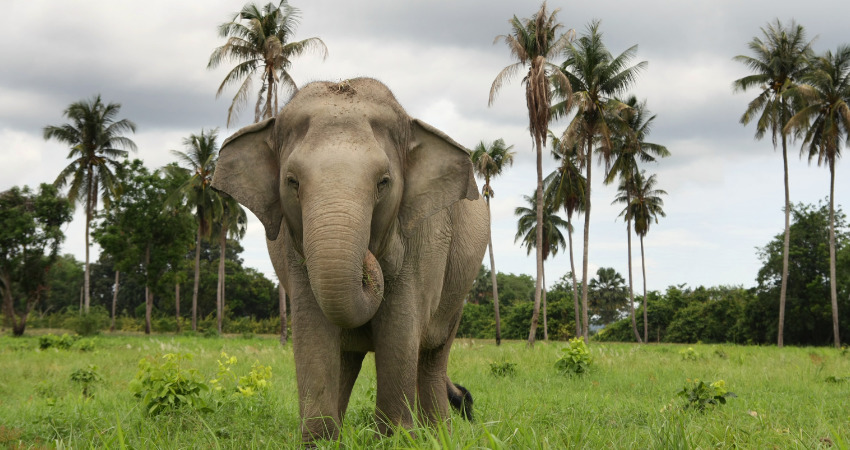When we talk about CBD oil in veterinary medicine, we mainly think about cats and dogs. But some exciting research is now underway in a growing number of animals. In this article, we look at a new trial which explored the use of medicinal cannabis in supporting the health and wellbeing of an Asian elephant – with encouraging results.
In recent years, there has been growing interest in the use of medicinal cannabis for treating various health conditions in animals, particularly dogs and cats. Here at CBD Vets Australia, our network of veterinarians has seen first-hand how symptoms and quality of life can be significantly improved thanks to the therapeutic benefits of CBD.
This has led to researchers exploring a wider clinical application of cannabidiol in supporting the wellbeing of other animals. While further investigations are needed (and are already underway), preliminary findings published by international research teams have highlighted the potential of CBD in a range of clinical settings.
Exploring cannabidiol therapy in a zoological setting
In 2020-21, a research team conducted an 8-week trial with a female Asian elephant in a wildlife conservation park in Mexico. The objectives of the trial were to evaluate the therapeutic effect of CBD on the elephant’s skin abscesses and lesions, her food selectivity and decreased appetite, as well as her decreased mobility and exploration behaviors; and to determine the incidence of any adverse effects. This is the first report described in literature regarding the use of CBD as a complementary treatment in the veterinary care of elephants.
Why CBD was used to treat an Asian elephant
At the time of the study, the Asian elephant was around 55 years old and living in the care of the conservation park since 2009. During the initial clinical examination, the elephant was found to be experiencing several ailments:
- Skin abscesses on the palmar and plantar sides of her front and back feet, as well as lesions in the nails.
- Decreased appetite, decreased food intake, and increased food selectivity.
- Reduced movement and exploration behaviours, related to the abscesses on her limbs.
A CBD-isolate compounded medication was administered orally to the elephant at a dose of 0.05 mg/kg/day.
The promising results of the trial
At the conclusion of the trial, the researchers found encouraging results. For each of the ailments mentioned above, the following changes were observed:
- The abscesses in the nails and feet decreased in size.
- Her decreased appetite and food selectivity stopped by day three of CBD administration.
- The improvement in appetite was the first and most evident change. Prior to CBD treatment, the elephant had had periods where she only ate 30% of her daily ration. With the CBD treatment, her food intake was estimated to be around 90% of her daily ration.
- This decrease in food selectivity and increased appetite resulted in favourable weight gain of 252 kg in only five weeks.
There were also some incidental changes in the elephant’s behaviour reported by the researchers:
- Prior to the trial, she would take several minutes coming out from her night house. This time decreased during her treatment with CBD.
- Additionally, she had not visited the drinking fountain area of her enclosure for several months, and she was instead provided drinking water through a hose. The veterinary team suspected she did not visit the fountain area due to discomfort or pain in her limbs. After five weeks of CBD treatment, the elephant visited the fountain area at least three recorded times to drink water or bathe. This could suggest a decrease in the discomfort or pain in her palms and soles.
There were several disruptions to this case study due to the COVID-19 pandemic in Mexico. A lockdown was implemented at the beginning of January, which affected the patient’s husbandry and case follow-up. Unfortunately, this resulted in the loss of laboratory samples, having no weight records after 6 January 2021, and the interruption of the CBD treatment after 31 January 2021 due to financial limitations at the conservation park.
Conclusion: the future is bright
Skin lesions on the feet are among the most common ailments found in the group of elephants in this conservation park. Both treatment and resolution of these lesions are often complicated and delayed, making early detection and diagnosis key. Conventional antiseptic treatments provided by veterinary personnel, complimented by a systemic administration of CBD, may result in a quicker recovery time for patients, when compared to cleaning the lesions with antiseptics alone.
In this particular elephant’s case, the inclusion of CBD in her treatment was found to not only help in the improvement and healing of her abscesses, but also nearly eliminated food selectivity, increased her food intake and appetite, and improved her activity levels.
This study highlights the exciting potential of medicinal cannabis in improving the quality of life of elephants and other zoo animals, and the veterinary community eagerly awaits the findings of further studies. However, as with any new treatment, it is important to proceed with caution and consult with an experienced veterinarian before using medicinal cannabis for any animal.
The full paper is available for download here.
Please contact us on [email protected] or (02) 8294 9303 if you would like more information or training in prescribing legal CBD in veterinary medicine.




